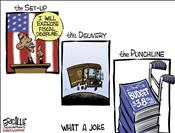Religion and Politics
Ok, I'll get on with it. Here is the comment I am responding to:
I read an article yesterday in the paper about a coalition of evangical leaders who have encouraged folks to pull back a bit in terms of linking politics and religion. (I can't find the link to this story). I also saw a pretty good piece on NOW that addressed a similar suject--preaching politics at the pulpit.
Here is a link to the story:
http://www.pbs.org/now/shows/404/index.html
What do you think about this?
Well, I don’t think there is an easy quick way to adequately answer your question. Especially without avoiding any possible misunderstandings but I will give it a shot.
So do I agree that we shouldn’t be preaching politics from the pulpit or that we should pull back from linking the two? No and here’s why. I have a problem with the fundamental premise of the debate. I don’t believe you can separate religion and politics they way many believe should be done. If you preach the Bible you will inevitably talk about certain issues, especially current issues that some would call “controversial,” and how the Bible relates to them. I would also say that these so called “political” issues have always been “religious” issues as well. However, I do believe you can and should separate out “party politics” from the pulpit.
There is a fine line to walk with a church or religious leader when it comes to these “political” issues but one they must if they are going to stay true to preaching the Bible, the whole Bible. It is impossible, unless they wish to water down the truth of the Scriptures, to say it is acceptable to simply avoid topics that may be perceived as controversial. Perhaps you could make many arguments for why avoiding those topics and focusing solely on issues that are more “positive” might be more beneficial but is that what the Bible teaches its leaders to focus on? God doesn’t allow for picking and choosing parts of the Bible as if you are at a religious salad bar.
As a Christian, why focus on avoiding the “controversial?” Jesus was controversial, the Ten Commandments are controversial, and so it is only logical that you will encounter “controversial” topics that might also be “political” in nature. Does that mean those topics are off limits? I would say absolutely not. Jesus Himself was very involved during His time on Earth. Jesus used scripture to lay a foundation for us to follow in life. In doing so He calls on us to be steadfast in our faith and what the Bible teaches as right and wrong but to do so with love, joy, peace, longsuffering, kindness, goodness, faithfulness, gentleness, and self-control. This is where so many Christians go wrong much of the time. It isn’t avoiding these issues but how we handle them that will make the difference. In fact if you stay true to the Bible you can never totally avoid divisive issues anymore than Jesus did in His time. If Jesus didn't avoid it than why do we think we have to?
Having spent some time in politics I can say it can often be a very ugly place. It is a place revolving around compromise in order to win power. The church must focus on the Word of God and from that everything will fall into place. The political parties; Republican, Democrat, Independent, etc. will ultimately fail a Christian voter. It is for this reason I would advise they don't lose track of their principles if their party ultimately choses to change direction. This also helps unite Christians rather than divide them by party lines. Does that mean Christians should never become politicians? No, but it is a heavy burden with many temptations to overcome. In fact I would go so far as to say that the church in general has failed to fulfill many of the roles our government has now been given in its place. (Perhaps an entirely separate topic for another day so I will leave it at that)
Unfortunately humans are not perfect and make mistakes. Christians and their leaders have made many mistakes and how they handle “political” issues is certainly one of them. To simply not talk about those items that might be controversial is not what God calls us to do. How we approach and handle such issues is perhaps equally important to teaching what the Bible says about them. Christian leaders who are comfortable watering down or not talking about topics that could be divisive weaken the very foundation they claim to support. In addition those that preach “party politics” from the pulpit also do a disservice to those entrusted to their leadership. We currently live in what you could describe as basically a two-party political system. The political parties have a large role in determining power in our government. So figuring out how, as an individual Christian voter, to balance that fact without falling into the trap of “party politics” is something I still don’t have an answer for.




















































































































13 comments:
Thank you for your thoughts! I hope the piece was at least interesting--seems at some level it was thought provoking.
Good clear thoughts...I hadn't really split in my head the difference between political issues and party politics when it came to church and religious institutions.
Besides the fact that our nation was founded (i.e. politics) in part because of religious freedom. The government shouldn't tell you what to believe, but the church should be talking about what it wants in a government.
Well, I appreciate what you've said here, and I can understand where you are coming from.
As for the Bible, it is a source of information, inspiration, and instruction for Christians. To be pondered and studied. Christian churches are a great place for folks to dive in to that. But, ultimately, God gave humans free will, so we use those tools we've gained to go out and make the best decisions with what knowledge we have. The Bible serves as a moral compass for Christians (which can also establish criteria to inform voting decisions). So, I understand how you feel politics and relgion cannot be separated. For You. But as a secular nation, we cannot assume that the Bible is everyone's moral compass. If we are truly going to allow freedom of religion and thought I think we have to remember that--.
I don't know that any of us will ever have our needs met completely as voters (unless we run ourselves-that's the only way we can have our exact profile). I think we just have to find the leaders who best meet our needs most of the time and get behind them, trusting that they'll act in ways that uphold our right to think for ourselves, and that they'll take a stand on issues that matter and promote freedom for EVERYONE to continue to worship and think and vote as they choose.
And, my friends, I think that means we'll never come to a solution or final answer. We will all just have to give and take and tolerate one another!
I guess, for me it all comes down that the government should not be religiousized, but churches probably can't go without addressing some "Politicized" subjects.
My crazy, murky, liberal thinking...Lesley
Excellent comments, all!! Of course you all must know that I'm gonna have something more to say ...but my family has saved you all for now and I must go...I will return with my arguably annoying humor (most likely) and conservative based comments to come!!
(devilish grin) I love good conversations!
Although, I would like to asking for clarification on "secular nation." Is that in it's founding, current state or both?
^^ That's my question, too.
Did you know that most other countries in the world look at the US and see a Christian nation?
As a Christian, that scares me. We may have been founded on Christianity, but I certainly don't want Britney Spears to be a representation of Jesus to those outside our country!
Although, define "Christian" these days. It can mean a lot of things. Nevertheless, helpful or accurate label or not I agree that we are generally looked upon as a "Christian" nation and knowing how that must appear is appalling to me as well (another example: Grand Theft Auto). Yikers!! (I love that word - I think I got that from my sister Traci)
I challenge you all to use that word sometime tomorrow! And then let me know if the people around you thought you had lost your mind. :)
Secular nation: Not a theocracy.
I'm sorry I failed to be clearer.
Good point. I think we can probably all agree that it is accurate we are not a theocracy (and I'm glad of it). We are not even a democracy, (give me a chance to back that up before someone thinks that I have lost it) we are a "republic."
Some of you might find it odd that I am going to offer a link to the VERY liberal Senator Byrd (trust me I may need some antacid to get through this - Just Kidding) but I think this speech of his on the Senate floor was very well put and provided us with historical examples. For those interested here it is... http://byrd.senate.gov/speech-repub.htm
You may have already found it, but I assume that the story read was referring to the Evangelical Manifesto (http://www.evangelicalmanifesto.com/) released last Wednesday. I heard about it when listening to an interview with Rev. Adam Hamilton discussing his new book Seeing Gray in a World of Black and White (http://stream.publicbroadcasting.net/production/mp3/kcur/local-kcur-703728.mp3).
To "Anonymous": What story? I'm not sure what you are referring to. Also, I have to be honest. I've never heard of the Evangelical Manifesto. However, I will research it further so I know what you are referencing.
Marty figured it out. It was right in front of me but I couldn't see the forest for the trees. It was the story you originally spoke of (and referenced in my original post) but couldn't find the link to. Sorry, I can be quite slow sometimes.
Also, since I couldn't figure out what you meant I wasn't sure it was from you. I hate to assume who wrote a comment when there isn't a signature.
So, unless we are wrong, everyone just disregard my last comment.
And I am in the process of listening to the interview you provided the link to as well as watching a debate on this very topic. Here's the link if anyone is interested...
http://speakingoffaith.publicradio.org/
programs/evangelical_politics/
Les (I often do that in my head. Do you still go by that sometimes or would you prefer Lesley?)
Anyway, I disagree with a lot said in the interview but I can very much understand where he is coming from. Bottom line for me (in my attempt to keep this response short) I don't think religious leaders should get involved in "party politics." I do think those leaders and their congregations should stand up for what is taught in the Bible regardless of if it is a "political," "divisive" or "controversial" issue. How that is done is often directly related to how effective they will be.
Regardless of all of that I believe it is the duty of everyone to be an informed voter!! I also believe that you can be patriotic and celebrate our great country without having to check your faith at the door (quick reference to the panel discussion link I provided earlier).
Religion and politics. Tough topics.
Post a Comment